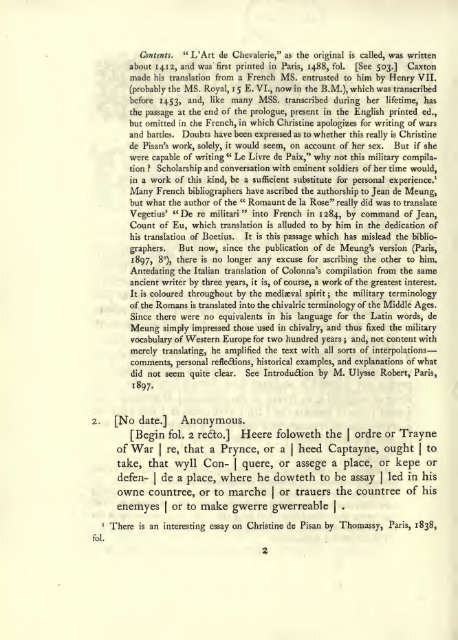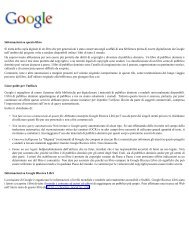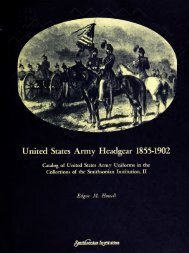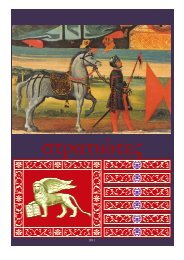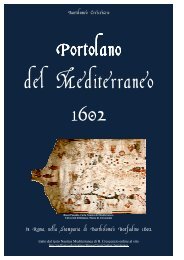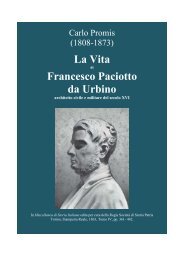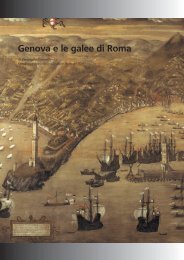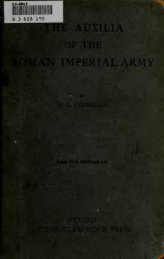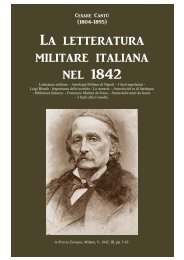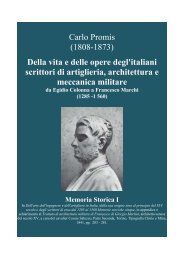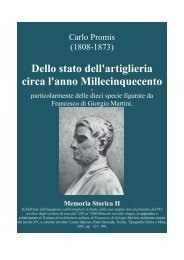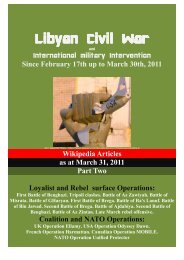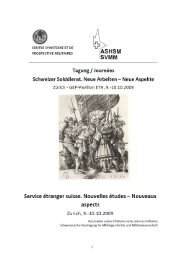- Page 1 and 2:
UNIVERSITY OF CALIFORNIA LIBRARY
- Page 4 and 5: m Digitized by the Internet Archive
- Page 6: *** Only 250 copies printed. 'This
- Page 9 and 10: A BIBLIOGRAPHY OP ENGLISH MILITARY
- Page 11 and 12: INTRODUCTORY NOTE. ^ONE know so wel
- Page 13 and 14: Their advocates must have argued in
- Page 16 and 17: I. From the " BuchsenmeuUrey " of F
- Page 18 and 19: those being recommended which had b
- Page 20 and 21: ; own work, adding countless others
- Page 22 and 23: — and the writers would seem to h
- Page 24 and 25: — both by direct translation and
- Page 26 and 27: and Julius Africanus, the Greek tex
- Page 28 and 29: interesting comparison between the
- Page 30 and 31: Of Italian printed works exclusivel
- Page 32 and 33: The English books have been treated
- Page 34 and 35: French I cannot speak, as there is
- Page 37 and 38: LIST OF CATALOGUES CONSULTED. The B
- Page 39 and 40: , PLATES. Frontispiece. From the "
- Page 41 and 42: ANCIENT TECHNICAL WRITERS. Xenophon
- Page 43 and 44: vention. Printed by Thevenot, but a
- Page 45 and 46: tion: Paris, 1739, ^^"-^ Italian tr
- Page 47 and 48: ; formations of the Persians, Turks
- Page 49: ERRATA. Page 1 6, footnote. For "au
- Page 53: BIBLIOGRAPHY OF MILITARY BOOKS. ENG
- Page 57 and 58: y Beare, | by John Maylerre for | J
- Page 59 and 60: — Black letter. Quarto. Collation
- Page 62 and 63: in. iT'iBriK tmtMStff Htht9ow^ tau*
- Page 64 and 65: u of THE Ci'ALU 3 1 ". r ,1
- Page 66 and 67: I ende — of the Booke | lulii. I
- Page 68 and 69: Second Edition. Fifteen-seventy-thr
- Page 70 and 71: — 15. Fifteen-sixty-three. Gale,
- Page 72 and 73: ^ "' learning, and died about 1574.
- Page 74 and 75: — creased, and largelye | amplifi
- Page 76 and 77: : Black letter. Quarto. Collation.
- Page 78 and 79: I 25. Fifteen-seventy-nine. Digges,
- Page 80 and 81: ullet in its course is a " sedlion
- Page 82 and 83: —: battells, in I as otherwise to
- Page 84 and 85: — \ Men breede-straet by de Anoth
- Page 86 and 87: : — Black letter. Quarto. Collati
- Page 88 and 89: Contents. A standard work of the ti
- Page 90 and 91: : 'also in come gunpowder, | to sho
- Page 92 and 93: 1 • o^45* ^3 said to give the gre
- Page 94 and 95: 42. Fifteen-eighty-nine. Ive, Paul.
- Page 96 and 97: Amen." omnipotenti, : 46. Fifteen-n
- Page 98 and 99: in fortune that he ascribed " to th
- Page 100 and 101: 48. Fifteen-ninety. Londoiio, Sanch
- Page 102 and 103: 52. Fifteen-ninety-one. Loque, Bert
- Page 104 and 105:
^^' Added to Garrard's "Art of Warr
- Page 106 and 107:
— 58. Fifteen-ninety-three. A sur
- Page 108 and 109:
fedt Rules the manner and forme how
- Page 110 and 111:
Half-title to Pt. II. : "The | The
- Page 112 and 113:
: Warre."— Sigs. in 4", A-Y. The
- Page 114 and 115:
had gained a great reputation, at t
- Page 116 and 117:
72. Sixteen-hundred. Edmonds, Sir C
- Page 118 and 119:
, , , 4. — Quarto. Collation. Tp.
- Page 120 and 121:
Call to pocket the men's pay ; dril
- Page 122 and 123:
— other side the Pikemen are all
- Page 124 and 125:
Mavrice of Nassav. | Translated out
- Page 126 and 127:
— Sj. Sixteen-sixteen. Orders est
- Page 128 and 129:
mighty Lords ... of the vnited Prov
- Page 130 and 131:
1 temporaries, wh6 are so careful t
- Page 132 and 133:
' CopUs. B.M. i Bod. Contents. This
- Page 134 and 135:
—- Epitome of the qualities requi
- Page 136 and 137:
"postures," " His Excellencies Book
- Page 138 and 139:
Contents. Drawn up by W. G. with th
- Page 140 and 141:
drawne from the aftioris of the | P
- Page 142 and 143:
IV. The Double-armed Mao, ty the Ne
- Page 144 and 145:
| The — ... By Ed- Armes, and the
- Page 146 and 147:
: no. Sixteen-twenty-seven. Hugo, H
- Page 148:
—: Collation. Engraved efhblemati
- Page 151 and 152:
115. Sixteen-twenty-eight. Woodall,
- Page 153 and 154:
— Quarto. Collation. Mus. Cat. Co
- Page 155 and 156:
— 120. Sixteen-twenty-nine. Aches
- Page 158 and 159:
VI. y/o^^l^^^^^^^^Bf/f^\^^/Lucas Ku
- Page 160 and 161:
— diags.—R.H. : "The First[-Thi
- Page 162 and 163:
fiue first Bookes entire : quent Bo
- Page 164:
—: Irish. M. DC. XXXIV. I At Brux
- Page 167 and 168:
— 132. Sixteen-thirty-five. G., F
- Page 169 and 170:
; Cavalry, | Or, | Horse-Troopes. |
- Page 172 and 173:
VIII. tit ^/'/AotiOTL The 3 motwnle
- Page 174 and 175:
erie^ Anno 1637. | 108 our Captalne
- Page 176 and 177:
' ' | Mac-Keyes Regiment) levied in
- Page 178 and 179:
'^^ Wherein are set forth exa6lly t
- Page 180 and 181:
By Certaine Certain — Collation.
- Page 182 and 183:
tailing vernment of His Maiesties A
- Page 184 and 185:
I As also Sundry Colledlions taken
- Page 186 and 187:
Gentleman in the Army. | London, \
- Page 188 and 189:
— — now seasonably | published
- Page 190 and 191:
Necessary | Observations | Concerni
- Page 192 and 193:
two. I Read All Or None ; | And Pri
- Page 194:
" primarily for the use of English
- Page 197:
autograph letter of Sir F. Vere, fr
- Page 202 and 203:
XI. From Valtur^ "Z)^ re militarV\
- Page 204 and 205:
Art all in B.M. Almirante mentions
- Page 206 and 207:
^^. 5°^- [No place, author, nor da
- Page 208 and 209:
— Art qual si voglia numero de pi
- Page 210 and 211:
Art scientia militari, omnium Bello
- Page 212 and 213:
— Art Quarto, z-hi in 4" ; A-Z, A
- Page 214 and 215:
Art Militare libri cinque" with the
- Page 216 and 217:
Copies. B.M. , : Art 552. Vinegia.
- Page 218 and 219:
— Art singulis locis praecipue in
- Page 220 and 221:
Art 571. Fiorenza. 1594. Ammirato,
- Page 222 and 223:
Art j^8i. Madrid. 1596. Mosquera de
- Page 224 and 225:
Art maggiore. Come s' habbi a regge
- Page 226 and 227:
Art governatori di fortezze et qual
- Page 228 and 229:
Art 608. Francofurti ad Moenum. 160
- Page 230 and 231:
Art —Almirante. Germ, trans.: Mii
- Page 232 and 233:
Art 625. Lucca. 161 6. Deir Orgio,
- Page 234 and 235:
. Art 633. Palermo. 1624. Lanario y
- Page 236 and 237:
Art 643. Padova. 1634. Gianolio, Fe
- Page 238 and 239:
Art 653. Rouen. 1641. Billon, Jean
- Page 240 and 241:
Artillery. angchorigen Mathematisch
- Page 242 and 243:
Copies. Bod, (1596), 172 Artillery.
- Page 244:
Artillery. Oftavo. a, 6, A-M in 8*.
- Page 247 and 248:
68 1. Venetia. 1608. Pinclli, Anton
- Page 249 and 250:
" 689. Amsterdam. 1625. Schmidtlap,
- Page 251 and 252:
Quarto. A-Z, AA-RR in 4«. Artiller
- Page 253 and 254:
CAVALRY AND EQUITATION. 705. [1485
- Page 255 and 256:
710. [i575-] Bruyn, Abraham de. Cav
- Page 257 and 258:
719- Venetiis. 1607. Massario Malat
- Page 259 and 260:
mentioned by bibliographers j like
- Page 261 and 262:
j 736. Udine. 1636. Aquino, Gio. Pa
- Page 263 and 264:
Oblong Quarto. )t(, A-Li, containin
- Page 265 and 266:
^ 746. Venetia. 1570. Grassi, Giaco
- Page 267 and 268:
7S5' Venetia. 1606. Giganti, Nicole
- Page 270 and 271:
xiir. From the '* Archite£iur'' of
- Page 272 and 273:
Fortifica- Fr. trans.: Paris, 1870,
- Page 274 and 275:
Fortifica- 772. Venetia. 1564. Magg
- Page 276 and 277:
Fortifica- luoghi, et a quelli che
- Page 278 and 279:
Fortifica- 788. Parigi. 1588. Ramel
- Page 280 and 281:
Forrificayg^, Melun. 1 598. Bachot,
- Page 282 and 283:
Fortifica- en Allemagne," and 1620-
- Page 284 and 285:
Fortifica- Quarto, a, A-Z, AA-GG in
- Page 286 and 287:
Fortifica- autori et successe di gu
- Page 288 and 289:
' Fortifica- Another ed. : Venezia,
- Page 290 and 291:
Fortifica- Fortification von Regula
- Page 292 and 293:
Manufiacture of firearms and powder
- Page 294 and 295:
; Medical. 0
- Page 296 and 297:
Medical. ' : . tormentorum bellicor
- Page 298 and 299:
Medical 864. [n. p.] 1 634. Rhumeli
- Page 300 and 301:
' Military On single combat. Taken
- Page 302 and 303:
Military 878. Lugduni. 1 549- Laude
- Page 304 and 305:
Military 88/. Valladolid. 1558. Alv
- Page 306 and 307:
Military 895, BasilcjE. 1 578. Acqu
- Page 308 and 309:
— Military 905. Lisboa. 1 598. Sc
- Page 310 and 311:
; Military 916. Bologna. 1 623. Bal
- Page 312 and 313:
Miscella- Pref. dated 1572. The pre
- Page 314 and 315:
PYROTECHNICS. 931. Venetia. 1540. B
- Page 316 and 317:
Pyrotech- propres pour assieger, ba
- Page 318 and 319:
: Topo- possono. Nel secondo, e ter
- Page 320 and 321:
Topography. 949- Basel. 1 614. Zubl
- Page 322 and 323:
4- Paris. 1617. Audiguier, Vital d'
- Page 325 and 326:
INDEX. The arable figures refer to
- Page 327 and 328:
; Arte of shooting in great Ordnanc
- Page 329 and 330:
—; Catanco,G., 19, 529,541, 541,
- Page 331 and 332:
: — Eguiluz, M. dc. $69. Eld^ G.
- Page 333 and 334:
: . . — Harper J R. 158. Harrison
- Page 335 and 336:
Macchiavelli, N., 1 2, 1 3 $, p. Ar
- Page 337 and 338:
Orbicius. xvii, xxxvii. Order of Mi
- Page 339 and 340:
—; Saint JuHen. 677, 803. Saint R
- Page 341 and 342:
: — — Treatise of Artificial Fi
- Page 345:
I ' RETUT "IRt «ATf r" ^-^


